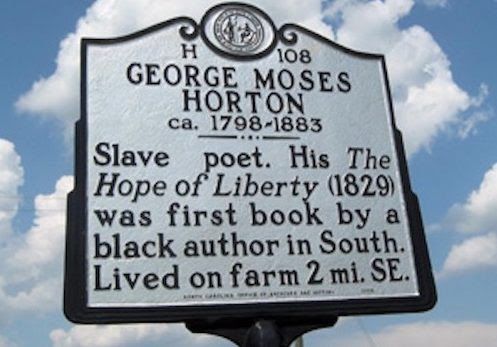
Celebrating National Poetry Month
George Moses Horton (a. 1797-ca. 1883)
George Moses Horton, poet, was born in Northampton County, the property of William Horton who also owned his mother, his five older half sisters, and his younger brother and three sisters. As a child, he moved with his master to Chatham County, taught himself to read, and began composing in his head a series of stanzas based on the rhythms in Wesley hymns. In 1814 he was given to Mr. William’s son James, at whose death in 1843 he passed to James’s son Hall.
By the time he was twenty, George Moses Horton had begun visiting the campus of The University of North Carolina eight miles away. There he sold students acrostics on the names of their sweethearts at twenty-five, fifty, and seventy-five cents. For several decades he “bought his time” from his masters through the sale of his poems and through wages collected as a campus laborer. Caroline Lee Hentz, novelist and professor’s wife, encouraged him; his first printed poem, “Liberty and Slavery,” appeared in Mrs. Hentz’s hometown Massachusetts newspaper, the Lancaster Gazette, on April 8 1829. Soon plans were made to purchase his freedom and transport him to Liberia. To raise funds, Mr. Horton’s The Hope of Liberty, the first book published in the South by a black man, came later that year from the press of Raleigh’s liberal journalist Joseph Gales, but profits were inconsiderable and the plans were dropped. From time to time, Mr. Horton won the admiration and support of such men as Governor John Owen, presidents Joseph Caldwell and David L. Swain of The University of North Carolina, and newspapermen William Lloyd Garrison and Horace Greeley. His poetic protests of his status are the first ever written by a slave in America.
In 1845 Dennis Heartt of the Hillsborough Recorder brought out The Poetical Works of George M. Horton, The Colored Bard of North-Carolina, To Which Is Prefixed The Life of the Author, Written by Himself. Seldom was Mr. Horton without a manuscript for which he was gathering subscriptions from admiring students and friends. In April 1865 he attached himself to Captain Will H. S. Banks, and thereafter followed Captain Banks’s Michigan cavalry unit to Lexington and Concord. Captain Banks sponsored Mr. Horton’s third book, Naked Genius, published several months later from the press of William B. Smith in Raleigh.
Through Mr. Horton’s unhappy marriage to a slave of Franklin Snipes, he was the father of a son Free and a daughter Rhody, both of whom bore their mother’s name. Mr. Horton’s last years were spent in Philadelphia writing Sunday school stories and working for old North Carolina friends who lived in the city. Details of his death are unrecorded. [Source]
April is National Poetry Month, and this year is the twenty-fifth anniversary of this annual celebration. Throughout the month we will highlight notable poets in our newsletter. You can learn more about National Poetry Month here.

